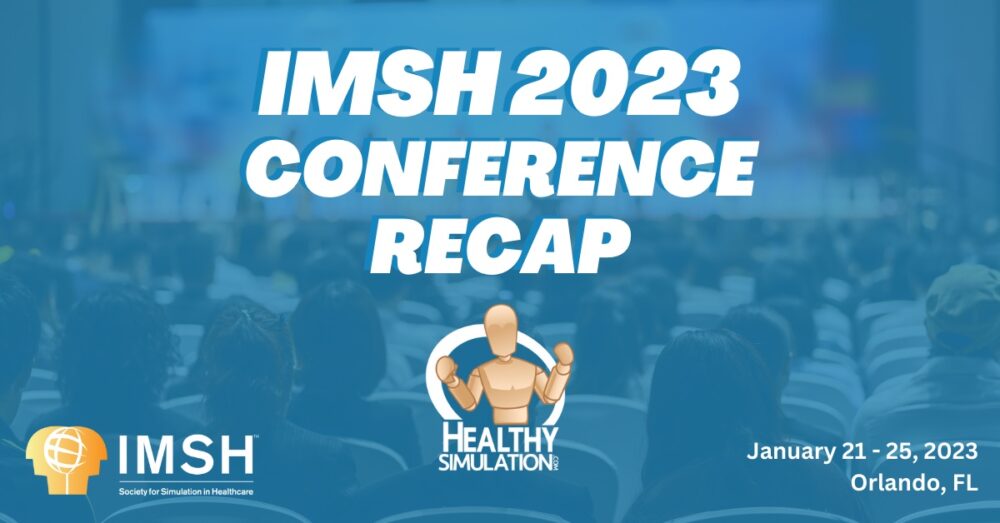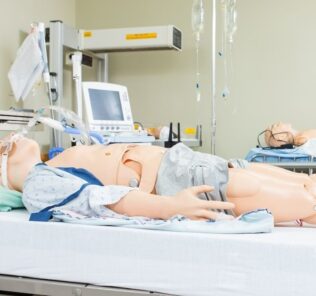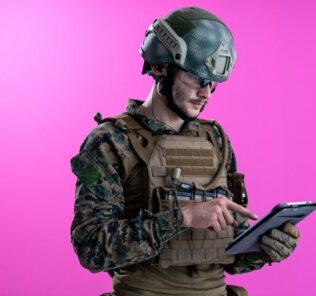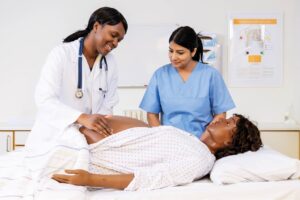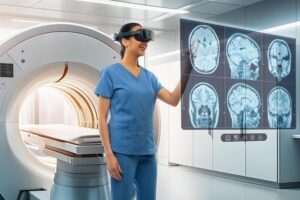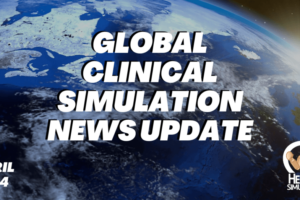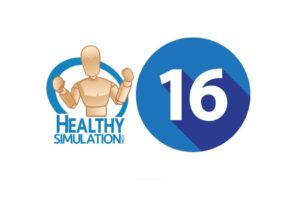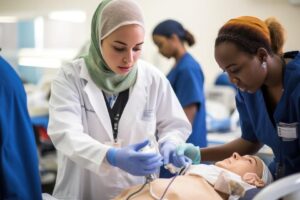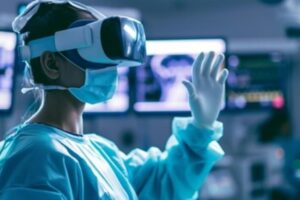IMSH 2023: Healthcare Simulation Conference Recap
The International Meeting on Simulation in Healthcare (IMSH) is the world’s largest conference dedicated to healthcare simulation learning, research, and scholarship, offering 250+ sessions in various formats, from large plenary sessions to small, interactive immersive courses. This healthcare simulation conference is considered to be an educational and networking event for the clinical simulation world. For this reason, many medical simulation vendors choose to have major company announcements coincide with the event. The event will take place this year from January 21 to January 25, 2023, in Orlando, Florida. This HealthySimulation.com article recaps the clinical simulation conference, sharing highlights and major takeaways from each day of the event.
Now in the conference’s 23rd year, the in-person event, along with a virtual IMSH Delivers, will offer hundreds of industry-leading presentations, cementing the event’s place as the world’s premier healthcare simulation education learning event. In recognition of the many milestones the healthcare simulation industry has achieved, the IMSH 2023 Planning Team chose the content theme, “A Standard of Excellence.”
The Society for Simulation in Healthcare states: “Chasing excellence requires effort and determination for groups or individuals who are obsessed with continuing to set a new standard. We all must take up the challenge of disrupting the status quo and continuing to strive to reach the next level. As a community, we reflect on the work of the past to set the tone for continued exploration in the field of healthcare simulation. Our challenge to never settle is a call to action for each individual to make the future of simulation one that you would be proud to set.”
Sponsored Content:
Healthcare Simulation Conference Daily Recaps
Day 1: Sunday, January 22
Leading off the day’s events, program leaders thanked all those involved in helping to coordinate IMSH 2023. This included recognizing content reviewers, SSH staff, and others. Next, Education Management Solutions CEO Matt Merino took the stage to explain how the need for innovative solutions is more important now than ever before. He shared how EMS is dedicated to creating solutions to meet the challenges that lie ahead.
Merino next introduced Haru Okuda, MD, FACEP, FSSH. The CEO & Executive Director USF Health Center for Advanced Medical Learning and Simulation, Okuda began his welcoming by encouraging attendees to make connections and highlighted that IMSH 2023 is taking place in the largest exhibit hall in event history – hosting 4,091 meeting registrants. Additionally, he shared that the “SSH 2028 Strategic Priorities” include sustainability and growth, education and learning, credentialing, research and innovation, and individual/organizational/legislative advocacy.
Coverage by Jill Sanko, PhD, APRN, CHSE-A FSSH:
Day 1: Master’s Classes
Sponsored Content:
The Academy of the Society for Simulation in Healthcare offers master classes. This series is focused on helping established healthcare simulation professionals solve problems they are grappling with. The program offers the opportunity to work with some of the academy fellows to work through issues as well as build a community of professionals with clinical similar problems. On the first day of IMSH 2023, a group of Academy Fellows met with interested IMSHers focused on problems in education, administration, and operations.
Attendees were given time to share some of their identified problems and discuss them with the Fellows and other attendees. Interested healthcare simulation professionals with five or more years of experience were invited to submit a request to participate in the longer-term mentoring program. Selected individuals will meet with the Fellows again on Tuesday and will have a follow-up with a Fellow on how their issue is resolved or being resolved in 4-6 months.
In the education group, many spoke about the issue of not having time, buy-in, or enthusiasm for faculty development. Ten of the close to 40 attendees from the education group submitted their request to participate in the Tuesday session and follow-up meeting.
Opening Session Highlights – commentary
The IMSH meeting was kicked off with a call to the community to set a Standard of Excellence, highlighting the theme of the meeting. The planning team reminded us why healthcare simulation is so important and what our dedication to the field means for healthcare and patients. They emphasized that achieving excellence requires teamwork, coordination, and collaboration. They hope that we all leave here with a new connection, a new way to collaborate, a reaffirmed commitment to our work, and a zest to continue to build a Standard of Excellence for healthcare simulation.
IMSH 2023 boasts one of the largest meetings with over 4000 people registered. 1,200 submissions (this encompasses research abstracts and educational content) were reviewed by over 250 volunteers. This year also marks a milestone for certification; a decade of certification. We now have certified clinical simulation educators and operations professionals all over the globe.
Attendees were introduced to a new initiative to assist in continuing to build a Standard of Excellence; with the launch of a new fund aimed at supporting larger research initiatives, providing opportunities for developing sim in developing nations, awarding more opportunities for developing nations to send individuals to this meeting thru larger scholarships, and continue to support Chad Epps’ legacy. This fund will help to give much-needed funding and support to educate and grow healthcare simulation across the globe. As of Sunday morning, $35 thousand dollars had been raised with a goal of raising $45 thousand by the end of IMSH.
Each IMSH is preceded by a ‘mini meeting’ focused on a particular topic. In rotation is the research summit. This year marks the 3rd research summit. Like prior summits, the amazing research being carried out was highlighted. A recap of the work presented will take place on Tuesday.
The plenary speaker that started us off on the journey this year was Joe Mull. Joe is an author, speaker, and former human resources professional. As I listened to this dynamic speaker I really tried to see how can I take what he is sharing and apply it. Those in the audience who are administrators likely had the easiest time putting his message in the context of their day-to-day work, as much of his talk focused on how to be a better boss and how to assure the commitment of employees.
His message is important and timely in the face of a trend of “quiet quitting.” This isn’t exactly what it seems, but it is something we need to pay attention to. The idea doesn’t mean stopping all work, but rather stopping doing what is perceived as, what I like to call “other duties as assigned” – the stuff that you are expected to do, but weren’t hired to do.
For those in the audience who are educators, I feel like his message might have been a harder one to connect with. Feeling this way myself, I tried to shift my listening from just hearing the message and wondering, what do I do with this, to applying the message to what I am currently doing, educating. As I started to dabble with this application, I realized that educators are bosses of a sort, so these principles are very applicable. It was just a matter of shifting my view.
Joe Mull introduces three circles as part of his trademarked term EmployalityTM. In one circle is ‘great boss,’ the next ‘ideal job,’ and the last ‘meaningful work.’ Each of these ideals has three corresponding attributes: A great boss equals building trust, coaching, and being an advocate, ideal job equals appropriate compensation for the work being asked, manageability of the workload, and flexibility to get the job done. Finally, meaningful work equals purpose behind the work being asked, work that plays to one’s strengths, and work that cultivates a sense of community of belonging. Importantly when these circles come together they form a Venn diagram; in the center, commitment is found.
Applying Joe’s lessons to education – I will call this “Educationality” (perhaps I can trademark this), I have come up with the following ideas of how educators can shift our thinking from an educator to a great educator. A boss is defined as “a person who is in charge of a worker, group, or organization”, this is not so different from educators who are in charge of students, groups of learners, and often organizations.
If we look at our jobs using this lens, the ideals of being a great employer are easily be applied to being a great educator. As an educator, I challenge you to think like a boss. Can we educate better by building trust with our students, coaching with compassion, and advocating for them? The answer to all three of these is yes! Can we educate better by providing more feedback to help learners improve; can we better balance workload in the context of a single activity, course, and across the curriculum; can we move away from hard deadlines and allow some flexibility? The answer to these three is probably – yes.
Finally, can we educate better by aligning education with a purpose (the purpose that will eventually be their job, how they give back to the world, and how they play their part in making this better); can we develop bespoke assignments and assessments that play to learners’ strengths (I am thinking about the multiple choice test taker versus the essay writer types) and still know that the lessons had meaningful outcomes; can we foster belonging with more intentionality? The answer to these three questions is also yes. This shift will take work, but I think if we do we will be building toward a new Standard of Excellence in education – we will call it – “Educationality.”
Press Box Videos
Day 2: Monday, January 23
Opening Monday’s Plenary Session, the IMSH planning chairs reminded attendees that today is the first full day of educational course offerings. To receive credits, learners must fill out each course survey. Then, they shared the day’s content theme: technology. Many of the latest healthcare simulation technology products will be on display throughout the day in the exhibit hall (from 9:30 AM to 4 PM).
Next, SSH President-Elect Barry Issenberg took the stage to discuss the impact that emergency healthcare services have on society. He explains that training in these lifesaving techniques has vastly improved over the years. Notably, he highlighted Laerdal’s work to help this industry expand through the development of healthcare simulation patient simulators. Across the world, Laerdal has worked to “save more lives together.” For this reason, IMSH awarded Tore Laerdal the “Pioneer in Simulation Award.”
In accepting this award, Laerdal explained that innovation is about impact. He added that better implementation of knowledge and solutions already in place is essential – but requires collaboration.
After several other awards were distributed, Lou Oberndorf, Chairman and CEO of Operative Experience, provided a lecture on innovation in healthcare simulation. He explained that innovation and challenge “doesn’t come cheap.” Thus, he emphasized the importance of the SHH fund, Building the Next Generation of Excellence. Ovendorf shared that his family is thereby committing to a four-year $50,000 gift starting in 2023.
Coverage by Rémy Roe
“Data, data, data: Practical tools for data collecting” was a 60-minute panel presentation by Chad Roth, MA, of the University of Florida’s Center for Experiential Learning and Simulation (CELS). Roth discussed processes used to determine what data to collect, tools to do so, and lessons learned from his experiences across a diverse background spanning two decades in logistics and distribution operational management. Roth wasted no time trying to convince the audience of the data’s value, keeping the main point simple: Data equals knowledge.
Regardless of the size, budget, or accreditation of a Healthcare Simulation Center, one cannot manage what they do not measure. Roth provided actionable steps and resources to get started with data collection via programs like Microsoft Excel or Qualtrics. A great takeaway for anyone in the field was that tracking data is an invaluable starting point for centers seeking accreditation or an increase in budget or staffing.
Also on Monday, “Deeper than manikin color: Design toolkit for DEI simulation” was a 90-minute hands-on workshop presented by a team from Children’s Minnesota and led by Dr. Samreen Vora. This session was in such demand that not all the attendees who showed up were able to join due to space. Dr. Vora’s team shared work being done by their institution, including “The Role of Bias in De-Escalation,” a simulation training course where clinical staff and organizational leadership identify implicit bias by working with standardized patient (SP) actors from diverse backgrounds.
Representation within clinical teams was also discussed, with Dr. Vora highlighting how diverse teams operate with increased creativity and have higher retention rates. Another metric worth noting was that teams comprised of diverse individuals were twice as likely to make accurate diagnoses than homogenous teams.
Dr. Vora and her team concluded the session by separating the attendees into large groups where individuals shared their experiences and lessons learned regarding DEI in healthcare simulation. Finally, attendees were given free resources to aid in the development of DEI-focused healthcare simulation, including the V.I.T.A.L.S. (Walker et al., 2022) tool for responding to microaggressions, and the OWTFD tool (Sotto-Santiago et al., 2020), both of which are available for free on MedEdPortal.
“Speed Mentoring: A Networking Event with Leaders in Healthcare Simulation” was a 90-minute session featuring an all-star lineup of mentors, including: Rami Ahmed, DO, MHPE, Marc Auerbach, MD, FAAP, MSc, Kirsty Freeman, FSSH, Ph.D. (c), MHPE, Jared Kutzin, DNP, MS, MPH, RN, FSSH, Melissa Lowther, AS, CHSOS, Donna McDermott, Ph.D., RN, CHSE-A, Vivienne Ng, MD, MPH, Tom Nowicki, MD, FACEP, Yasuharu (Haru) Okuda, MD, FACEP, FSSH, and Christopher Strother, MD.
The first 30 minutes of the session was a large panel discussion facilitated by Ambrose Wong, MD, MHS, MSED, and Joy Grabow from the Yale School of Medicine. Key takeaways from that portion of the session were discussions centered around where the mentors saw the field of healthcare simulation being in the next 5-10 years and how a junior simulationist could best go about seeking mentorship opportunities.
The general consensus on the near future of the field was that augmented reality (AR) and virtual reality (VR) modalities would continue to be hot topics of interest and that simulationists could make themselves invaluable by being technically competent in their use.
However, the room also agreed that even the most up-to-date technology cannot be overly depended upon and that healthcare simulationists should always endeavor to use the best modality for a given situation, not always the newest or most advanced ones. When discussing best practices for seeking mentorship, the experience of the group really shined with these key points:
- Follow up with people you meet at events like IMSH, SimOps, and Sim GHOSTS
- Talk to people and network at events. Attending sessions and going back to your hotel room is a wasted opportunity.
- Be specific and clear about what you need mentorship in or about. If it isn’t something a mentor feels they are suited for, chances are they know whom to connect you with. This point was emphasized by outgoing SSH president Dr. Haru Okuda.
- Be creative about where you look for mentorship. Sometimes the perspective of someone outside your area of vocation or interest is the fresh lens you need to see things through.
- Ask mentors or people in your environment about their mentors, even coaches need coaches.
The second portion of the session was an hour of rotating through the mentors present. Groups of 3 mentees made their way through 5 mentors during 9-minute Q & A sessions. Each mentor had a general area to discuss (i.e., administration, formal training, research, career advancement) and conversation-starting questions available on that topic. However, mentees were also encouraged to present their own queries and topics of discussion. All the mentors provided contact information and enthusiastically encouraged anyone who felt cut short on time to follow up.
References
- Sotto-Santiago, S., Mac, J., Duncan, F., & Smith, J. (2020). “I didn’t know what to say”: Responding to racism, discrimination, and microaggressions with the OWTFD approach. MedEdPORTAL, 16, 10971.
- Walker, V. P., Hodges, L., Perkins, M., Sim, M., & Harris, C. (2022). Taking the VITALS to interrupt M“The
- Role of Bias in De-Escalation.”microaggressions. MedEdPORTA, 18, 11202. https://doi.org/10.15766/mep_2374-8265.11202.
Setting The Standard of Excellence IMSH23 with LuSi and Test Chest
Press Box Interviews
CEO Matt Merino shared more about new @SIMULATIONiQ innovations that help maximize data, outcomes, distance-based education and training. #IMSH2023 @SSHorg pic.twitter.com/Lh48Vo57ws
— HealthySimulation.com (@HealthySim) January 23, 2023
From the importance of learning from the aviation side of simulation to overall advocacy, Evans shares how @CAEHealthcare is working to move the #healthcaresimulation industry forward. Don’t miss the full interview! pic.twitter.com/XtHZMmLtPv
— HealthySimulation.com (@HealthySim) January 23, 2023
Day 3: Tuesday, January 24
IMSH leadership began Tuesday’s plenary by announcing that IMSH 2023 officially broke the conference’s attendee record. After this exciting announcement, they moved on to discuss the importance of pushing the status quo to disrupt and ultimately advance the industry. In doing so, SSH completes ongoing research to work toward increased knowledge, awareness, and innovations. Chair of the SSH Research Committee Michelle Kelly, Ph.D., RN, FSSH, gave an overview of the work the organization is doing, and then research abstract awardees were announced.
Just announced: 2023 @SSHorg Simulation Research Summit Goals #IMSH2023 pic.twitter.com/r5tE1x2fa0
— HealthySimulation.com (@HealthySim) January 24, 2023
Next, the Michael S. Gordon Center Lecture on Medical Education was presented by Vice Admiral Racquel Bono, MD, MBA, FACS. Her discussion focused on “Excellence Through Disruption,” and her work in healthcare simulation through the military.
Kicking off today’s plenary with the Michael S. Gordon Center Lecture on #MedicalEducation, presented by Vice Admiral Racquel Bono, MD, MBA, FACS. #IMSH2023 pic.twitter.com/AMRqSIiRxP
— HealthySimulation.com (@HealthySim) January 24, 2023
Bono explained that the advocacy of others is incredibly important to disruptive excellence. Other factors include self-belief, leadership for change being uncomfortable, and generational. She also shared how metrics are extremely beneficial when working to meet targets. Further, she noted that healthcare simulation leadership must “look back to go forward.”
Coverage by Rémy Roe
CHSOS-A Timothy Shea from the University of North Dakota is a seven-time presenter and three-time content reviewer for IMSH. This year he led a 60-minute discussion centered on low-cost manikin modifications and room adaptations to solve problems frequently experienced by the healthcare simulation operations specialist. Shea’s presentation was straightforward, systematically addressing each problem and his team’s solution. Most of Shea’s recommendations were minimally invasive.
However, for the more complex solutions, he highlighted having verified with vendors that his modifications did not void warranties or have the potential to damage equipment. For example, a system developed to hardwire defibrillation pads directly to a Laerdal Simman 3G was presented that Shea claimed Laerdal approved as a modification that did not void any warranty or service agreement.
More Press Box Videos
Day 4: Wednesday, January 25
More About IMSH Delivers
IMSH Delivers 2023 consists of educational content live-streamed from the in-person event and prerecorded sessions. Livestreamed content will be recorded and included in the IMSH Delivers 2023 Collection. Virtual attendees have access to earn a total of 30 IPCE credit hours. Additional courses from the IMSH Delivers 2023 Collection will be available for an additional $25 per IPCE unit. The IMSH Delivers 2023 Collection will be comprised of:
- Livestream of Plenary Sessions (Up to 4 speakers)
- Livestream of eight (8) sessions from the in-person meeting. One course from each general session time block will be live-streamed to the virtual audience
- 40 recorded educational courses
- 15 recorded SimVentor Demos
- 15 recorded Oral Research Abstract Presentations
- 5 recorded Learning Lab presentations
- Virtual exhibitor profiles
More About IMSH
Hosted by the Society for Simulation in Healthcare (SSH), the International Meeting on Simulation in Healthcare (IMSH) is a scientific conference that explores the latest innovations and best practices in healthcare simulation. IMSH provides the tools and resources healthcare professionals need to advance their skills, impact change in delivery systems and practice, and, ultimately, improve patient safety.
Plan ahead: IMSH 2024 will be held from January 20 to January 24, 2024 in San Diego, California.
Read our other #IMSH2023 Coverage for more details:
- IMSH 2023 Day 1: Healthcare Simulation Conference Coverage
- CAE Healthcare Showcases Customer-Centric Educational Ecosystem at IMSH 2023
- IMSH 2023 Day 2: Healthcare Simulation Conference Coverage
- EMS Launches Intelligent Immersive Reality Learning Solution at IMSH 2023
- IMSH 2023 Day 3: Healthcare Simulation Conference Coverage
- HealthySimulation.com, SSH Host Press Box at IMSH 2023
Learn More About IMSH 2023
Lance Baily, BA, EMT-B, is the Founder & CEO of HealthySimulation.com, which he started while serving as the Director of the Nevada System of Higher Education’s Clinical Simulation Center of Las Vegas back in 2010. Lance is also the Founder and acting Advisor to the Board of SimGHOSTS.org, the world’s only non-profit organization dedicated to supporting professionals operating healthcare simulation technologies. His co-edited Book: “Comprehensive Healthcare Simulation: Operations, Technology, and Innovative Practice” is cited as a key source for professional certification in the industry. Lance’s background also includes serving as a Simulation Technology Specialist for the LA Community College District, EMS fire fighting, Hollywood movie production, rescue diving, and global travel. He and his wife Abigail Baily, PhD live in Las Vegas, Nevada with their two amazing daughters.
Sponsored Content:



